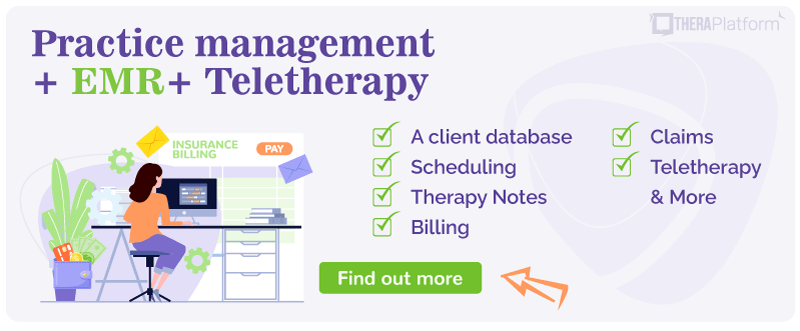Managing a group practice for therapists

Running a group practice for therapists can be both rewarding and complex. This guide will assist you in effectively managing a group therapy practice and includes a comprehensive overview of the organization structure for a group practice, human resources management, clinical management, and other vital areas.
Effective management is crucial to the success of a group practice. Efficient management can lead to several benefits, such as improved client care, increased staff satisfaction, and ultimately, the growth of your business.
Organizational structure for a group practice
Defining roles and responsibilities: To help operations run smoothly, clearly define the roles and responsibilities within your group practice.
Key positions within a group therapy practice include a clinical director overseeing the quality of clinical services and administrative staff performing office tasks. The essential job duties of the therapists who provide care should also be defined.

Leadership team: Establishing a leadership team with diverse skills and backgrounds can allow team members to approach various challenges effectively.
Creating a management hierarchy: Develop a clear hierarchy to ensure smooth decision-making and operations. This hierarchy can be designed to facilitate communication, allowing for an efficient response to any potential issues.
Human resources management
Finding and retaining top administrative and clinical staff can contribute to the success of your practice. Here are tips for human resource management.
Recruitment and hiring: Effective channels can help you hire highly qualified therapists and support staff. Strategies such as leveraging professional networks, job boards, social media, and networking with local universities can help with this process.
Onboarding and training: Effective onboarding is essential for ensuring your new hires understand your policies and procedures and the culture of your group therapy practice. Ongoing training programs can help your staff remain current on best practices regarding administration and therapy.
Performance management: Implementing performance evaluation and feedback systems allows practice owners to complete constructive staff performance assessments. This ongoing feedback can foster a culture of accountability and help therapists continue to improve their skills.
Staff development: Providing opportunities for professional development and continuing education can encourage staff retention and satisfaction. Facilitating the advancement of staff's clinical and administrative skills through certifications, workshops, and conferences benefits the quality of care provided and the efficiency of the practice as a whole.
Employee retention: Retaining valuable employees is key to managing a group practice. Strive to create a positive work environment with enhanced job satisfaction through strategies such as recognition programs, fostering open communication, and allowing flexible scheduling.
Clinical management of a group practice
Ensuring high standards of clinical care within a practice is essential. Promote client satisfaction and maintain quality care through consistent training and supervision and adherence to best practices within your field.
Provide clinical supervision and support for therapists through access to resources, opportunities for peer collaboration, and regular case study reviews and can contribute to a supportive culture.
Implementing effective case management systems can help streamline the therapeutic process. Consider utilizing technology to enhance efficiency and improve client outcomes through tracking areas such as follow-ups.
Collecting and utilizing client feedback can help group therapy practices continuously monitor and improve areas of services. Implement surveys and feedback forms to obtain valuable insights.
Administrative management
Office operations: Efficient management of day-to-day office operations and administrative tasks facilitates smooth functioning. Streamlining processes, such as documentation, billing, scheduling, and client communication, can alleviate some of the burdens associated with administration.
Scheduling systems:
- Implement efficient scheduling systems, such as online scheduling tools for client appointments and staff meetings.
- Enhance the ease of operations.
- Allow staff to manage their time effectively.
Billing and payments: Implement systems that help streamline the billing process to ensure timely payments are completed. Utilizing electronic billing and payment systems can help with this and reduce the workload of your administrative staff.
Record keeping: Maintaining accurate and confidential client records is essential for adhering to legal requirements and providing quality care. Therapists can use electronic health record (EHR) systems to ensure compliance and simplify record-keeping.
Practice Management + EHR + Telehealth
Mange more in less time in your practice with TheraPlatform

.
Financial management
Strong financial management is an essential component of running a group therapy practice.
Develop and manage budgets to ensure financial stability. Review financial performance regularly and adjust budgets accordingly to address potential financial challenges.
Identify and manage multiple revenue streams, such as insurance and private pay. By diversifying your revenue sources, you can help enhance the practice's financial stability and growth.
Expense management is critical. Control and optimize expenses by reviewing expenses regularly and implementing cost-saving measures when possible.
Generate regular financial reports to track the financial health of the practice. Analyzing these reports can help you make informed decisions and identify potential areas of financial improvement.
Technology and systems
Develop a strong IT infrastructure that is reliable and scalable to meet the needs of your practice as it grows. Set up and maintain IT systems, including hardware and software, to support your therapy practice's operations.
Implementing and managing EHR systems can allow for efficient client management. Ensure that the EHR system you chose complies with privacy regulations and can integrate with other practice management tools.
Integrate telehealth services to make your services more accessible to a broader range of clients. Choose a telehealth platform that is HIPAA-compliant, user-friendly, and secure.
Utilizing robust cybersecurity measures protects client data. Security protocols should be regularly updated to safeguard against potential data breaches and maintain privacy regulations.
→ Download My Free EHR (+practice management software) Buyer’s Guide for Therapists
Marketing and client acquisition
Develop and maintain a strong brand identity to help attract and retain clients. Your brand should be well-defined and reflect your practice's values and mission.
Utilizing digital marketing strategies, including SEO, social media, and content marketing, can enhance your practice's visibility and attract new clients.
Consider creating referral programs to attract new clients. Encourage existing clients to refer new clients by offering incentives or rewards.
Build relationships with the community and local organizations. Participating in community events and offering workshops, you can gain helpful connections and increase your practice's visibility.
Compliance and risk management
Ensuring compliance with legal and ethical standards is paramount in clinical practice.
Stay informed about any potential updates to regulations, and implement policies that follow these best practices.
- Stay up-to-date with regulations and licensing requirements. Review requirements regularly for any changes to ensure your practice stays in compliance.
- Identify and mitigate risks associated with clinical practice and business operations. Implement effective risk management strategies that can protect your practice from possible liabilities.
- Maintain the appropriate insurance coverage needed for your practice and staff. Review policies to ensure they fit your ongoing needs and provide adequate protection.
Quality assurance and improvement
Implement quality control measures to maintain high service standards.
Conduct ongoing reviews of clinical best practices and operational procedures to ensure they meet your established benchmarks.
- Fostering a continuous improvement and innovation culture can positively impact staff and client satisfaction. Assess your practice's performance and make adjustments accordingly.
- Track client progress and evaluate the effectiveness of specific treatment approaches to measure and improve client outcomes. Consider analyzing data regularly to help make informed decisions about treatment approaches.
- Regularly evaluate the practice's performance, making necessary adjustments to ensure continuous improvement and growth.
Communication and team building
Establishing effective communication channels within the practice allows for regular collaboration.
- Conduct regular team meetings to discuss updates, issues, and strategies. These meetings allow staff to collaborate and promptly address potential concerns.
- Organize team-building activities to create a cohesive and collaborative work environment. Design activities that strengthen relationships and enhance teamwork.
- Implement strategies for resolving conflicts and promoting a positive work environment. Address issues promptly and provide positive support to team members to effectively resolve disputes.
Effective management of a therapy group practice involves a comprehensive approach. From establishing clear roles to ensuring compliance and quality care, several essential components are involved.
By implementing effective management strategies, practice managers can create a supportive environment for staff and clients, enhance client care, increase staff satisfaction, and drive the growth of their practice.
For additional resources, consider exploring the following:
- Management Guides
- "The Complete Guide to Private Practice: Everything You Need to Know to Build and Grow Your Private Practice" by Dr. Shannon S. McCall
- "The Business of Therapy: How to Make Your Private Practice Thrive" by Melissa J. Edey
- Professional Associations
- National Board for Certified Counselors (NBCC)
- National Association of Social Workers (NASW)
- The Association for Behavioral and Cognitive Therapies (ABCT)
- American Speech-Language-Hearing Association (ASHA)
- Online Tools
- TheraPlatform: A practice management software with tools for electronic health records, scheduling, billing, insurance and reporting for group practices.
- Slack: Facilitates internal communication within your practice through direct messaging, file sharing, and integration with other apps.
- Trello: Offers visual tools such as task boards, lists, and cards to track practice goals, encourage team collaboration, and organize workflows.

Resources
TheraPlatform is an all-in-one EHR, practice management, and teletherapy software built for therapists to help them save time on admin tasks. It offers a 30-day risk-free trial with no credit card required and supports mental and behavioral health, SLPs, OTs, and PTs in group and solo practices.
More resources
- Therapy resources and worksheets
- Therapy private practice courses
- Ultimate teletherapy ebook
- The Ultimate Insurance Billing Guide for Therapists
- The Ultimate Guide to Starting a Private Therapy Practice
- Mental health credentialing
- Insurance billing 101
- Practice management tools
- Behavioral Health tools
Free video classes
- Free on-demand insurance billing for therapist course
- Free mini video lessons to enhance your private practice
- 9 Admin tasks to automate in your private practice
References
Etareri, L. (2022). Fundamental stages of development through the relevance of team building. Medicon Engineering Themes, 3(10), 48-56. DOI: https://themedicon.com/pdf/engineeringthemes/MCET-03-058.pdf
Olson, E. M., Olson, K. M., Czaplewski, A. J., & Key, T. M. (2021). Business strategy and the management of digital marketing. Business horizons, 64(2), 285-293. DOI: https://doi.org/10.1016/j.bushor.2020.12.004
Temel, S., & Durst, S. (2021). Knowledge risk prevention strategies for handling new technological innovations in small businesses. VINE journal of information and knowledge management systems, 51(4), 655-673. DOI: https://www.emerald.com/insight/content/doi/10.1108/VJIKMS-10-2019-0155/full/html



